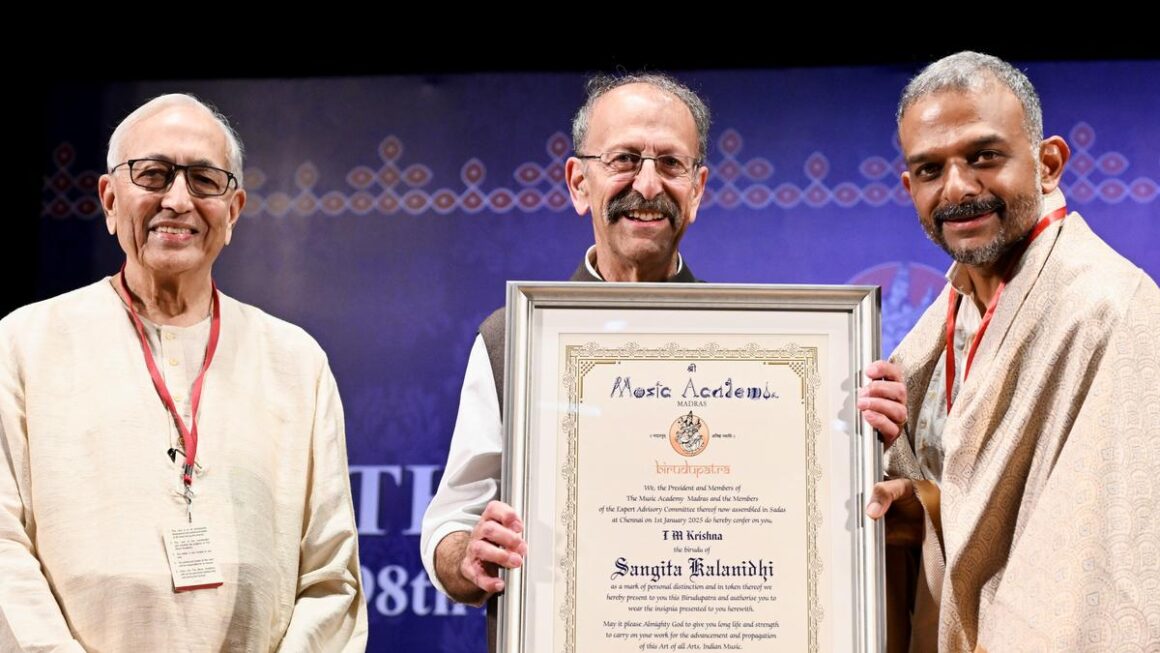
T.M. Krishna receives the award Sangita Kalanidhi from David Shulman, chair, Renee Lang Professor of Humanistic Studies Hebrew University, Jerusalem at the Music Academy in Chennai on January 1, 2025. N. Murali, president, Music Academy looks on.
| Photo Credit: S.R. Raghunathan
Renowned Carnatic musician T.M. Krishna was conferred the title of Sangita Kalanidhi 2024 by Professor David Shulman, Chair, Renee Lang Professor of Humanistic Studies, and former professor of Indian Studies and Comparative Religion, Hebrew University, Jerusalem at the 98th conference and concerts — Sadas, the traditional oriental convocation — of The Music Academy in Chennai on Wednesday.
Parassala Ravi and Geetha Raja were conferred the title of Sangita Kalaacharya and Dr. Margaret Bastin was the recipient of Musicologist Award 2024. Thiruvaiyyaru Brothers S. Narasimhan and S. Venkatesan, and violinist H.K. Narasimhamurthy received the TTK Award.
Speaking at the event, N. Murali, President, The Music Academy, and Director, The Hindu Group Publishing Private Limited, said Mr. Krishna’s concert held on Christmas Day was of ‘very high quality’ and the response from the audience ‘was truly overwhelming and the rapturous applause and standing ovation that the artist received were incredible’.
‘Surreal atmosphere’
“All in all, the rasikas, young and old, were in such high spirits and bursting with such energy and enthusiasm that the whole atmosphere was surreal in a sense. I would dare say that, if at all there is a musician who could attract into the fold of Carnatic music those outside it, particularly younger audiences, it is Shri T.M. Krishna,” he said. “The Carnatic music ecosystem needs such an induction sorely as there are structural changes already happening, which, institutions involved in classical performing arts, need to take serious note of.”
Mr. Murali said Mr. Krishna ‘distinguished himself in the role as the President of the 98th Annual Conference and Concerts’. “His brilliance absolutely shone through the entire season. The academic sessions have been specially curated for the first time in over 20 years with an overarching theme ‘Aesthetics and Synaesthetics: Reflections on Raga in Indian Art’,” he said.
Upon receiving the title, Mr. Krishna, who thanked the people of Uroor Olcott Kuppam, along with his friends and family, said his life changed after he was invited to organise a music festival in 2015 in Uroor Olcott Kuppam.
“My life over the past decade or so has had many rounds of disturbances. Many have lasted about a month or so, but 2024 was different. It was about eight months of non-stop action, if you can call it that. I know I’m tough, but sometimes, it is hard and it can get very lonely,” he said.
Mr. Krishna recalled his experiences of performing at The Music Academy on December 25, 2024. “It was not just about the number of people who gathered here. For me, it was not about that. It was not about the applause. It was not about the standing ovation. It was not about the screams or the howls and happiness. No, I think what made it unprecedented for me was that everybody here on that day was here for a very personal reason. And I left that morning with a lot of hope and a lot of joy, but above all, truth,” he said.
Professor David Shulman said Carnatic music possesses power to change self and change something in reality as well. “One of the features of Carnatic music is that you’re just capable of changing your life and also changing something in reality. Let me say that part of the reason for this, the magic of that kind of transformation, part of it, of course, has to do with the tremendous interpenetration and interdependence and more than symbiosis of the text, the verbal text, and the musical, melodic and rhythmic text. It’s one of the strongest features of this entire tradition, because Carnatic music, we all know it’s a music of compositions…as a compositional framework, and even if the composition exceeds itself in the course of performance, and wedding together of words and sounds, that’s a magical combination,” he said.
Published – January 01, 2025 11:26 pm IST


Leave a Reply